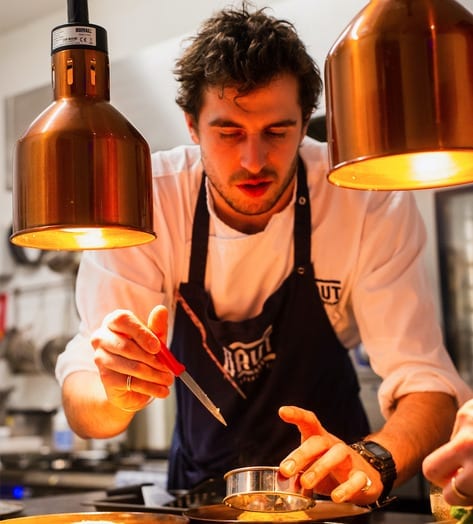This question from culinary school graduates comes up time and time again on the yacht chef pages. Many students graduate culinary school and have dreams of hitting the high seas and working on a superyacht straight off the bat. This may not always be the best idea…
We spoke to yacht chef Nico Garbo to get his opinion on this with the first of our short order opinion pieces by yacht chefs.

A short order piece by Yacht chef Niccolo Garbo.
No! Don’t do it.
We are in a reality where our job, as yacht chef (and any kind of chef to be honest), is under the spot light. Much of this has to do with shows like Below Deck and all the cheffing competition style shows and culinary programs on the telly.
When I graduated from culinary school, age 17, I thought I was the best chef in the world. And thank fuck I was already working at night in a nice restaurant! But that didn’t last for long, the other chefs soon made me realise that I wasn’t the best chef in the world.
I had the luck to work in a fine dining restaurant that holds 1 Michelin star, or macaron, like they call them in France.
I quickly learnt that the way was long, steep, slippery and not easy at all, and I was no one.
Yachts don’t form chefs. Busy restaurants do. Fine dining and Michelin starred restaurants do. Big hotels do. Boats, no, not really, not so much.

What should you do after culinary school?
After you finish culinary school, you should learn the ropes. Get ground into the job properly, learn the hierarchy. Even, work for free, or close to zero. You should learn respect towards the other chefs and especially towards the food.
Once you have a good or at least decent experience and you’ve worked your way up, and I’m not saying to executive chef, but at least chef de partie in a decent restaurant, you can perhaps think to approach the yachting industry.
Yachting is where you can develop your identity. Keep in mind, you don’t learn much on a yacht. In the best case it’s just 2 of you. Of course, this depends on the size of the boat. For example, a 150m yacht is run with a galley team of upwards of 6 chefs, so that it’s almost like not a yacht anymore.
I believe you need someone to look at, someone that challenges and pushes you. You need to learn to work under pressure, the real one. You need to think on your feet and improvise. A kitchen brigade is the perfect place to be in, to learn and understand how everything works, from A to Z. Not in a yacht galley.

Being a yacht chef can slow your culinary learning
And then again, yachts are addictive. Once you are in, you’re stuck. What you know, it’s what you know. It’s very hard to keep developing and keep it up on a daily basis. Your culinary learning will slow on a yacht.
Of course there are plenty of yacht chefs that never spent a day working in a restaurant. And many who didn’t go to culinary school at all. They are doing amazing work. Then there are chefs that every year go and stage in some really good restaurants in order to keep learning too. I’m just generalizing.
What I’m trying to say is that the real world back on land: the busy nights, the 500 people banquet, the service rush on a busy Saturday night, the pressure, the environment and the challenges on the jobs, are impossible to learn from a cooking book, and that is what builds you as a chef, and from there, you can take it and bring it with you on a yacht.
But not straight out of culinary school.

